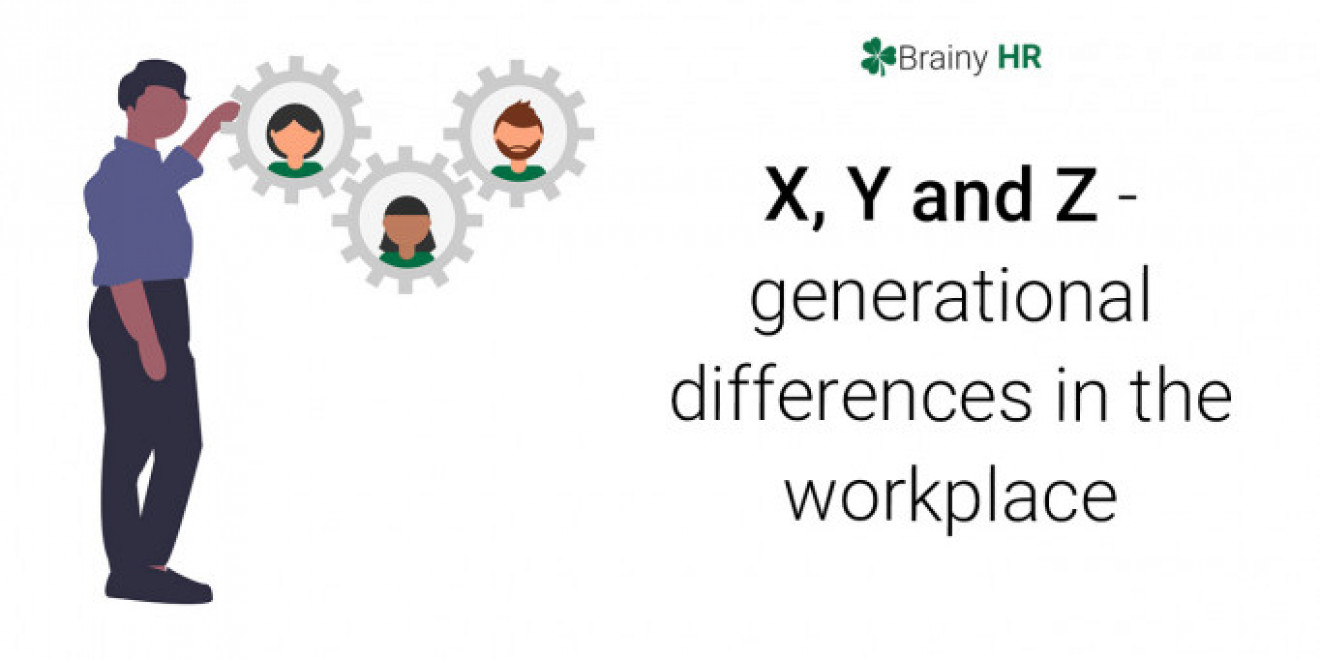Today, companies employ people from up to three generations. Each of the generations has different demands on the workplace. Employee retention is therefore one of the greatest challenges for employers. In order for companies to communicate effectively despite the diverse needs and expectations of their workforce and at the same time to attract, retain good employees, they need to be more innovative than ever.
BrainyHR has put together five tips on how you can be a better employer for your multi-generation workforce.

Differences between generations X, Y and Z in working life
Generation X and Y currently determine working life, Generation Z is already waiting in the starting blocks and will shape the future of the working world. But do they really differ so much when it comes to work ethic, work-life balance or leadership styles? We have summarized for you which values are important for each generation and how your work style is characterized. Find out what challenges your company is facing, how to find the right talent for you and how to keep it.
Generation X, Y and Z: who is who?
Different generations are shaped by generational experiences, such as wars or economic crises. 5 generations have been differentiated since the 1920s. The labor market is shaped in particular by generations X, Y and Z, because they represent the current and future workforce as well as managers.
Generation X: born between 1965 and 1980
Generation Y: Years 1980 to 2000 - a distinction is made between students and professionals
Generation Z: born between 1995 and 2010
Generation X primarily represents senior and C-level specialists, while Generation Y represents young specialists and future specialists. Generation Z is seen as the future of the labor market and is still in training, but is already influencing developments in human resources and employer branding with its expectations.
Values and motivation: that's what generations expect from working life
Generation X is shaped by the economic crisis and therefore focuses on career advancement. But a balanced work-life balance should not be neglected. They value independence and individualism in work design.
Work-life balance and self-fulfillment play an even more important role for Generation Y - if it was a bonus for the previous generation, it is a must for millennials. You are looking for a job that is fun and matches your personality. They also value networking at the workplace, both on a social and digital level.
Generation Z will place the highest demands on values such as independence and free development. Self-realization should not only take place in working life, but also in private life. That is why flexibility is particularly important - this applies to working hours, place of work as well as for the employer himself. Work is no longer tied to a company, but to your own specialist.
Work-fit: corporate structure, flexibility and technology are so important
“Work fit” is becoming more and more important for workers - the work should fit the personality. For the right work fit, factors such as work-life balance, professional training and tools used in the workplace must be right. Flexible working hours as well as workplaces (keyword home office) play a major role for all generations, although this is most important for generation
Fears and opportunities for advancement: The professional future of the generations
Generation X also sees the leadership position as an opportunity to act as a mentor and coach; it is important to them to pass on their knowledge. On the other hand, the millennials see the professional challenge and the higher earnings in particular as attractive. Generation Z behaves rather split. For them, the high level of responsibility within a leadership role is particularly interesting, but at the same time is afraid of not fulfilling this responsibility and expectations. This concern is more evident in women than in men. However, this usually decreases with increasing professional experience.
Your HR department will face these challenges
Working life within companies will increasingly be shaped by the generation mix. Generations X, Y and Z are all represented in a company's workforce. They have different expectations, fears and working methods for which solutions have to be found. HR managers are therefore asked to consolidate the topic of “diversity” in the corporate structure, everyday work and the mindset of employees. Special diversity and equality training courses or officers can help with implementation.
In addition to diversity, flexibility plays a major role. Offer opportunities for flexible and mobile work in your company. It is not just about working hours, but also the workplace as well as the work structures.
It is important not just to offer these options, but also to give your employees the feeling that it is okay to take advantage of them. Employees are often afraid to go out or work overtime to avoid being lazy.
Globalization and digitalization have become an integral part of a corporate ecosystem for most employees. You expect technologies and tools that enable networked work and automate processes. The technology you use should therefore always run smoothly and make your employees' everyday work easier, so that even a large company feels small and agile.
This is how you find, bind and lead employees
Above all, the “War for Talents” and high employee turnover will present companies with a major challenge. Generations Y and Z see a change of job as an opportunity to market their skills. In addition, working independently as a freelancer or starting your own company is becoming increasingly attractive. In the application fight, it is therefore no longer just other companies who are competitors, but also the candidate or employee himself.
In order to retain your employees and attract future managers, you should analyze the current management style in your company carefully. Managers become coaches. As a moderator, you should focus on open communication and inspiration and always convey the meaning and purpose of the work clearly. Cold commands and micromanagement deter talent.
This is how you can win the War for Talents
Whether generation X, Y or Z - professional development, work-life balance, the opportunity for self-fulfillment and the associated work fit are important to everyone.
Anyone who understands these subtle differences in the expectations and fears of the generations can win and retain extremely determined employees. Your HR department should therefore focus on the following topics:

Diversity: be an attractive employer across generations
Employee psychology: recognize individual fears and offer solutions
Work-Fit: choose a candidate that fits your company
Purpose: clearly communicate the meaning of the work in your company
Training: offer practical advanced training at an early stage
Agility: create agile processes for a flexible working life
Fluctuation: see staff turnover as an opportunity to find the best employees
If these points are reflected in your employer branding, you will win the right candidates in every generation for your company.


 Posted on May 14, 2020 by Anna
Posted on May 14, 2020 by Anna


